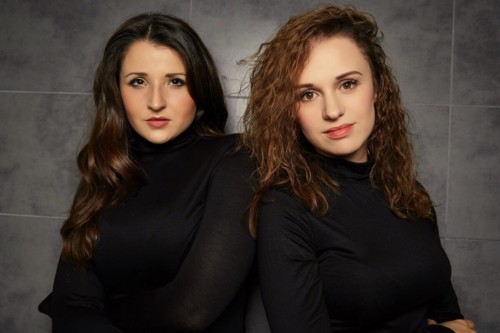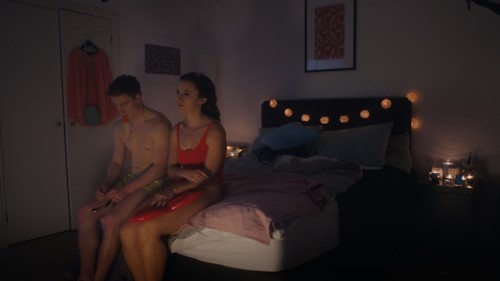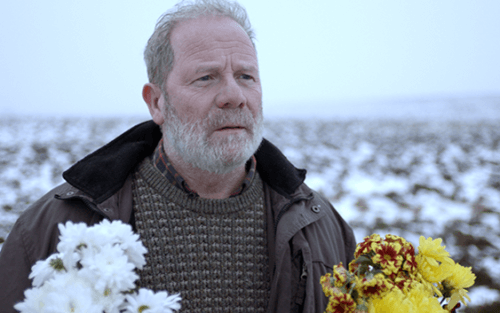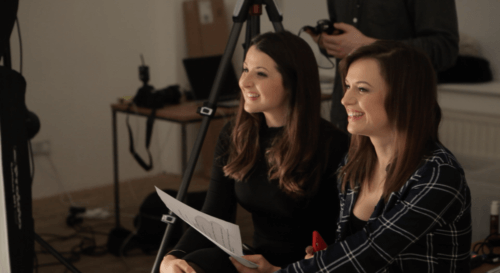Mini Productions’ April Kelley and Sara Huxley Discuss Industry Sexism, Getting an Indie Made and Acting On A Dream – Interview
The story of filmmakers April Kelley and Sara Huxley is as unusual as it is inspiring, with the two former drama school students creating their production house Mini Productions whilst in the midst of university, an act which would prove to be the catalyst for their ongoing careers within the arts and a host of award winning films in the years that have followed. I had the opportunity to sit down with the two filmmakers to discuss how their ever-growing empire of impactful films was forged, and I got to know a little bit more about their uplifting new project Acting on a Dream.
“We do it because we love it!”
Two twenty-something females forging their own paths through film production and performing arts is an inspirational story to anyone, yet the chemistry between Sara Huxley and April Kelley is the first and most lasting impression the business partners give. Recalling their first meeting with a glowing enthusiasm, the pair’s close bond and tightly knit professional partnership became clear immediately, with a successful career path seeming like an inevitability for such warm, interpersonal and go-getting personalities.
April: “We met through a mutual friend whom I’d met through the audition process and Sara had known her entire life. I was telling him about how I needed help and he suggested Sara, so I found her via Twitter and invited her out for tea, then realised I’d seen her in her final year show stripping on stage. I thought ‘we’ll get along just fine’. We met and chatted over each other for three hours in excitement, so I phoned my dad telling him ‘sorry, but you’ve lost your shares’. We’ve been ploughing on ever since.”
April: “It’s like looking in a mirror. People who don’t know us very well often ask “what is going on?” But we haven’t even known each other three years. When you know, you know.”
Considering their Mini Productions co-ownership deal to be a “contract of trust”, the pair have used the production label to develop and fund some of the most important British independent short films of the past few years and have worked to help others achieve their goals of making their own films, ensuring that independent British filmmakers still have the potential to give their art a voice in what is an always competitive marketplace. I asked them about their struggles in the UK market and whether they had comparisons to make with international cohorts.
Is it tougher as a British person to get your films made?
Sara: “When we went up to Berlin pitching our feature, there were teams from the UK, Canada, America, Ireland etc. We sat together to do all of our judging and all of the Canadian teams were so supportive; they can say that they’ve got money and creative backing from Film Canada. It’s really difficult to get funding in the UK – we’re not ‘trust fund babies’ and don’t have rich parents so we had to build our company from the ground up. Getting private investors is tricky and it takes a long time to get in with them, especially with such a lack of resources. I think our crews are some of the best in the world and I’m very pleased to be a British filmmaker. In terms of funding generally for the arts, I don’t think it’s held as highly as somewhere like France or Canada.”
April: “Funding here in the UK is a load of crap. You could easily be business savvy and find out the networks for high net worth individuals and talk about it, but it’s largely just ticking boxes and sometimes we don’t tick enough boxes to qualify for funding. I have, however, never seen my nationality as an issue. American films overall do better and dominate culturally because of a host of reasons, but if you chuck a Brit in amongst a bunch of Americans, you’re the crème de la crème immediately; so i personally never found it a hindrance or an issue.”
Would you agree with Timothy Spall that the British film industry has become less prevalent in the past 50 years?
Sara: “Definitely. The reason why we also do branding – viral, corporate, music videos – is because it takes so long to get each of our films off the ground, and while you can still raise money for them, there’s no guarantee that you can make that money back. I probably shouldn’t say that, but it’s so hard when you’re battling against the likes of Netflix and VOD etc. You can get films onto those platforms but people don’t go to the cinema like they used to. As a young production company, we’re in an equally wonderful position where we can maximise our savvyness in that online world, but the old format of making feature films is dying out and we have to change how we do it like everyone else is.”
April: “I think we’ve all become a bit hypocritical. This is not the case in all countries, but people are saying they want you to do one thing, but then they want you to do it the opposite way. They want to fund the minorities, but then they’ll curve your creativity and get you under their thumb – ‘how creative are they allowing us to be?’ is a question I believe needs to be answered.
It’s also a case that they want to help young, up and coming film makers, yet you can’t get funding unless you’ve worked with them before. You’re probably wondering how the hell you get into this; it’s kind of a catch-22, and it’s all political – it can become very tiring.”
Sara: “If you haven’t got a good network around you and you’re young, it’s still really hard – it’s a very competitive industry – from the acting to the producing, to the everything, it’s one of the most exciting but tough industries. We do it because we love it!”
Clearly motivated to adapt to the changing landscape of the film industry at all levels, I asked April and Sara if they believed that sexism still played as much of a major role as it seems to have done throughout the industry’s history, as was outlined by a recent Council of Europe report, and whether or not things were changing in that respect too.
Do you believe that the film industry is leaned more towards men?
Sara: “It’s a bigger social issue, but we’ve realised through freelance work (more commercial things), that film and entertainment is still a business and the reality is that men still, on average, get paid more. For a long time it was really dominated by white men in their forties and fifties. So while things are changing, there is still a battle, because when you’re operating right at the top – trying to drive them – a lot of the time you’re trying to raise money from or do business with investors, a lot of whom are white middle aged men. I feel like trends are developing however, and that even if you look at Netflix alone, the choice has become way more varied within the last year than it ever has been. So it’s shifting, but it’s been a long time coming and there’s still a lot of work to do.
I think that the recent media attention brought to sexist pay etc. in the industry has ensured that people have become far more aware. We went to a fantastic talk with Geena Davis who referenced watching cartoons with her children and realising that so many of the characters were men, and that this wasn’t an accurate representation of life. So through people like her, and the wonderful Meryl Streep, pioneering this, that has helped shift things, and I think that finally the big channels are beginning to listen. As film producers ourselves, we have become much more conscious about it, but not just regarding women. We’re also very conscious about diversity as a whole, because it is easy to overlook something like that, especially when making smaller movies. ”
April: “We’re a tricky generation when it comes to this. We always say that we’re a very fortunate generation when it comes to the internet, mobile phones and social media because we know life before it existed and we now know how to cope with it – at least in an overall sense – but with us trying to take on how people perceive gender or women in the media in general, it’s become clear that it doesn’t matter if you’re brought up in a family that is open, supportive and empowering, as when the media says the complete opposite, that becomes ingrained in you, so when you finally realise that something’s not right, you’re fighting it but it remains nerve-wracking. Your confidence can be seriously knocked by it.”
Sara: “I think that even when you’re writing or talking to someone its really easy to slip into “Maybe he did that, or think of a character as a ‘He’. The next generation of children will hopefully experience more balanced representations and grow up to think in a more balanced way, but it is definitely ingrained in us to see male protagonists in films.”
Switching gears from the political to the personal, I asked the business partners what their goals were and what they were wishing to gain from their part in the film industry.
What would be the ultimate dream, or have you already passed that?
April: “We got nearly shortlisted for a BAFTA and I think being nominated for a BAFTA or an award of its ilk would be incredible. Obviously, to make money is the main thing, but we always say that we love our job. Honestly, when you wake up and love your job every day – like you genuinely love what you do – it doesn’t feel like work. The goal for me is to have had an interesting, varied, successful life with Mini Productions and to be able to do lots of fun things like travelling and making films that I’m really proud of. We know a lot of people who hate their job and I don’t know why they do that.
Sara and I get really excited over small successes – we got an office phone and lost our shit. For me, I want to create something that makes people feel comforted. ‘Miss Congeniality’ was that when I was younger. When I was a poorly kid, an hour and a half of that would take my mind off things. Creating a series like ‘Friends’ or ’13 Reasons Why’, something that engrosses you and makes you feel safe to some extent, would be phenomenal.”
Sara: “I would love to make a really iconic series. We’ve got a few things that we hope could potentially be in the pipeline but it’d be great to make a series that everybody loved and that everybody knew. ‘Sex in the City’ was one of mine – for a few years i just watched it religiously. ‘Desperate Housewives’, too! Something like that would be a joy to make. Another thing that we’d love to do is be in a position where mini is stable enough and we’ve got enough credits behind us to just make work – just decide to make something and it’s made. It wouldn’t mean its an easy struggle, but we’d have enough resources, experience or contacts around us where we could make whatever we decided to make.”
You mentioned wanting to make an impactful TV series or film. “Cinema is the great empathy machine” and you guys made ‘Annie waits’ which I thought was really good. I hear you [April] won an award for that?
April: “Stop it, I’ve peeked! The film actually came about by chance because one of our friends’ boyfriend is a writer and they met at CAM when all three of us were there – Sara met him in the cue for the loo. His girlfriend said that Chris [Anastasi] had written something that would really suit us, ‘Annie,’ so we read it and thought it was brilliant. He thought that it could be made into a TV series and that was it. There’s part of you that goes ‘how can you, a guy, write a piece like that?’ I think that is an important question to some extent; if a woman was to write it, it could be a little bit too much, whereas what we’re finding is that a lot of men are enjoying it and relating to it, and a lot of that is down to Chris’ writing.”
I was one of those people. I’d like to commend you on your brilliant performance as well.
April: “It’s interesting because when we first watched the final cut – Sara still laughs at my moves every time – I was like, “shit! We’ve actually just made something that’s not what I wanted to make. This girl who goes man after man… that’s not Annie. In the series she hardly has any men, it’s more about her career and living in London and I got really nervous. I thought “crap. People are just gonna think that she’s a slut and it’s not gonna make any sense”, but then people like you have watched it and we get such a positive response and we’re so relieved that people do get it. It’s great!”
Was there much of you in the character?
April: “Some would call it ‘method acting’. That’s what I love about acting; you’ve got to find something of you in the character before you can even build from there. It’s completely me, it completely resonated with me, the only thing that was missing was a girl in the mix. I don’t ‘go through them’ that quickly and actually a month before we shot I thought ‘crap, I better get dating!’ I hadn’t dated in so long, so I went on the apps and for a great couple of weeks I went on breakfast dates followed by cocktails in the evening. I just wanted to meet a whole variety of people because when you’re in this industry you meet a lot of people, but don’t meet anyone that’s necessarily remarkably different, with a different background or have come to London for a different reason. I would never go on a dating app ever again, but I’m glad I did it.”
The road to getting ‘Annie Waits’ finished was quite remarkable, with the duo calling in favours from their many pages of trusted contacts to get the film made on a very low budget. April described the process as “pulling in every favour”, while Sara recalled co-producer Christian Cooke being in shock at how little they had spent in bringing their team together considering the relatively high cost of his own Mini Productions short film ‘Edith‘.
Sara: “We did ‘Edith’ with a big budget, and it wasn’t really logistical but we had to raise a ton of cash to make it happen, so when Christian walked on set for ‘Annie’ and saw that the crew was as big as ‘Edith’ he was a little shocked. When we told him we got the location for free and had just kind of stolen everything his initial shock developed into more shock, this time about how little it had cost us. The sad truth of it though, is that you can’t operate like that all the time. You can’t shoot things for nothing. We’re now on a mission to pay people, make money and actually pay ourselves, which is obviously a fun and interesting idea which sometimes happens. I do think that ‘Annie’ acts as proof as to what you can do when you’ve got a loyal crew around you, and we do pride ourselves on how well we look after our crew – I would put my hand on my heart and say that we go out of our way to make an effort to take care of every crew we work with because they are the people that go with you on that journey. It was definitely a testament to the high calibre crew we had that we managed to pull ‘Annie Waits’ off.”
April: “We were very fortunate because it was Marnie [Paxton’s] directorial debut and she has a lot of contacts. She’s been in the industry, she’s a script supervisor by trade, so with her networks, mine and Sara’s, and still buying many a friend a drink to thank them, it all came together. People wanted to support Marnie and see Marnie have this opportunity; it was as much for her as it was for anyone else involved. I’m just so proud of her and everything she has achieved – it’s a testament to someone who didn’t quite think that they were experienced enough or a ‘proper director’. It was wonderful to give her this opportunity.”
‘Annie Waits’ is one of how many films you have collaborated on?
Sara: “In terms of short films with short narratives? About ten or eleven.”
When you’re bringing these productions to life, do you have a ‘safe space’ to go to? How does the process work?
April: “We don’t do anything privately, that’s for sure.”
Sara: “When you aren’t freelancing, like we currently are, and you get those quiet moments; that’s when I find we’re really creative. We have a lot of ideas and get really excited by those ideas, and I think I would definitely say that although we are now experienced production managers and creative producers, we still get really excited when we have ideas and are writing them down. We’ve definitely had times in a pub or at Christmas where we’ve got out a massive piece of paper and written loads of ideas down and brainstormed stuff. I use a combination of that and thinking “who do we know writing wise, or directing wise that we can accommodate for?” But then on the flip side, we get some really wonderful writers and directors that also come to us, so it’s a bit of both really.”
Anything else to talk about?
Sara: “There’s a positive media company that we’re launching. Basically, we got fed up with seeing content that was crap and didn’t have any meaning, and we basically wanted to use our skill set and contacts to have a platform to put content on that matters. It will have video content on there that is inspirational, interviews with particularly interesting or amazing people. The first tester interview was a viral video about an inspirational teacher which is at about 37 million views now, but we just realised that there’s an audience out there and people want to see content that makes them think or challenge the way they think. We want to share stories that inspire people, motivate people. It’s called Acting on a Dream. You can find it at actingonadream.com and we also have an Instagram, Twitter and Facebook. We’ve got a professional interview series that will be part of it called ‘the dreamers series’ – it will be a high end series with quite well known faces. We’ve got exclusive interview with Jeremy Paxman, Kate Moss (author of “Labrynth”), Ricky Hall (model) Carly Rowena (blogger) and various actors whom we love. A whole bunch of people really!”
April: “Another thing to mention is that we’ve done talks, mainly for talent. We have these students (I cant believe they’re students, they look older than us), and they come up and tell us about not just not knowing how to get into the industry but also how maybe their families are making them go and do a different degree so that they’ve got a different degree to rely on. A lot of them tell us of how they feel constantly disheartened or constantly get told that it isn’t possible. Sara and I were very fortunate to have families that said “you know what, you do what you want. There’s no dream that is too big”. We come from families who have started their own companies from the ground up and I think its important for people to be allowed to do that and not be told to go to uni and get yourself a ‘proper degree’. What is a ‘proper degree’ nowadays anyway? There’s no such thing as job stability for life.”
Sara: “There are so many ways to skin a Cat. What we’ve found with the film industry particularly is you kind of learn as you go along, but there’s no set formula to success apart from working hard. People make feature films in so many different ways. people get into branded content, viral content, charity work etc. in so many different ways, so I think as long as you carry on on your journey, you are respectful to the people that you work with, and you give it everything, you will (touching wood) have a successful career.”
You can support April and Sara, as well as their production company Mini Productions, at the following links:
Mini Productions Website: miniproductions.co.uk
Mini Productions Facebook: MINI Productions Ltd.
Mini Productions Twitter: @Mini_Prods
April Kelley Twitter: @april__kelley
Sara Huxley Twitter: @Sara_Huxley
Make sure to check out Acting on a Dream at:
Website: actingonadream.com
Facebook: Acting on a Dream
Twitter: @actingonadream
Instagram: @actingonadream






